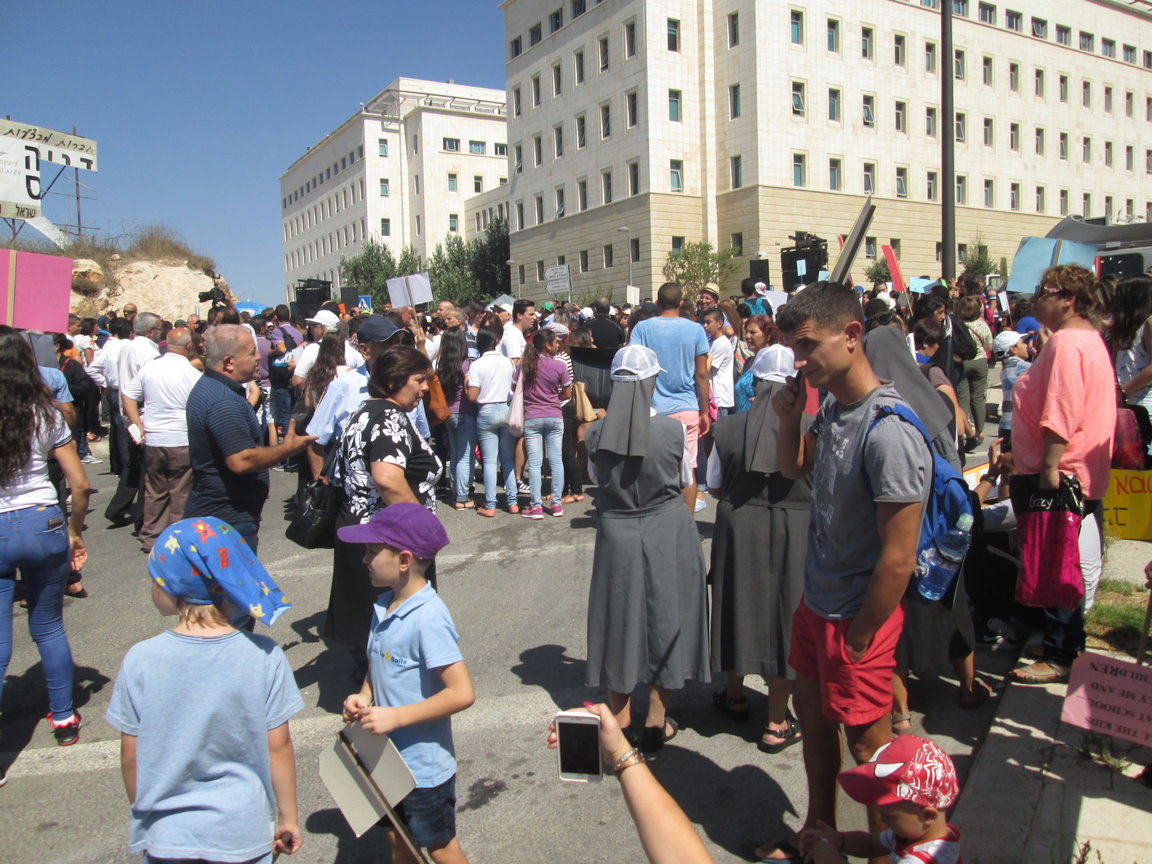Priest-Head of Christian Schools in Israel: ‘We Are in a Financial Crisis’
‘So far, we haven’t cut any educational programs, but it is just a matter of time,’ said Father Abdel Masih Fahim, head of the Office of Christian Schools in Israel.

JERUSALEM — Israel-based Church officials say the 50 million shekels — about $13 million — Israel’s Ministry of Education promised to provide the country’s struggling network of Christian schools for the 2015-2016 school year have yet to materialize.
“We are in a financial crisis. Money is very scarce,” Father Abdel Masih Fahim, head of the Office of Christian Schools in Israel, told the Register in late May. “The ministry keeps telling us, ‘The money is coming; the money is coming,’ but in the meantime, our schools are spending more than we are receiving.”
The funding, which was due in two installments — the first 25 million shekels on Dec. 31, 2015, and the second half on March 31, 2016 — was part of an agreement the ministry signed with the Christian Schools Office to end a 27-day school strike at the start of the 2015 school year.
That September 2015 strike, accompanied by public protests, meetings with visiting dignitaries and Israeli parliamentarians and pleas to the Holy See to intervene, was held to protest government funding cuts that have dug deeply into the school’s operating budgets.

Raed Fakhoury, a father of three, came to the fall demonstration because his children receive “an excellent” education, and he wants it to stay that way.
“We don't want to simply maintain our schools,” Fakhoury said. “We want to improve them. What our neighbors receive, we should receive.”
Today, the failure to transfer the funds means that many of the 47 Christian schools (all but eight of them Catholic) included in the agreement “are in danger of financial collapse,” Father Fahim said.
Over the past six years, the ministry has dramatically cut the Christian schools’ budget, claiming it lacks the money to support semi-private (known as “recognized but unofficial”) schools at the level it has in the past. Compounding the crisis, the ministry ordered the country’s semi-private schools not to charge more tuition than the government-designated limit, asserting that the higher fees are a burden to parents.
Although some mainstream semi-private Jewish schools have also been hurt by these cuts, the Ministry of Education fully funds two non-public ultra-Orthodox Jewish school networks, thanks to political wrangling between Prime Minister Benjamin Netanyahu and ultra-Orthodox politicians. Netanyahu’s coalition government would almost certainly collapse without the support of ultra-Orthodox political parties.
To compensate for the reduced government funding, Father Fahim said, the schools are relying largely on church donations and tuition fees. The schools are increasingly “in minus,” the Israeli term for overdraft.
While the remaining government funding pays for some of the basics, “We’re no longer able to pay to improve the schools or complete construction projects,” the priest said. “Our schools offer more matriculation exams than many other schools, and that means paying for more teacher hours. So far, we haven’t cut any educational programs, but it is just a matter of time.”
Father Fahim said the ministry has until now refused to offer Christian-school students the same government-funded enrichment programs offered at public schools. Nor does the ministry offer government-funded continuing education courses to church-affiliated teachers.
Wadi Abunassar, an adviser to the Bishops’ Conference Assembly of Catholic Ordinaries, called the situation “very sad.”
“The Israeli government is violating our agreement, and that’s not something new to us. We’ve tried to arrange a meeting with the education minister, but it has been impossible to reach him,” he said.
Abunassar, whose children attend some of the schools hurt by the budget cuts, noted that Christian schools, considered among the best in Israel, educate just 4% of the country’s Arab children yet produce nearly a third of all Arab university graduates.
“The vast majority of our graduates become employed taxpayers who contribute to the country’s economy. They are not a burden; they are an asset.”

Abunassar said he appreciates the education ministry’s attempts to cap tuition fees, “but as a parent, I understand the schools’ position. The ministry can’t on the one hand withhold funding, while at the same time refuse to allow schools to make up some of the gap through tuition. You have to remember that funding to our schools dropped from 75% of what public schools get for operating expenses to roughly 29%.”
“I view this as part of a systemic discrimination against Christians,” he said.
Father Fahim tried to be more diplomatic.
“I don’t want to say this is anti-Christian. It is ‘anti’ our schools. We are Christian schools.”
The Israeli government has said it will provide the schools full funding if the schools change their status to “public” schools.
Church officials say such a move would lead to an unacceptable loss of autonomy.
Michal Cohen, director-general of the Ministry of Education, said in a statement that “it should be emphasized and made perfectly clear that the Ministry of Education honors the agreement and underscores its obligation for its complete fulfillment. Therefore, the 50 million NIS [shekels] has been allocated by the treasury and will be passed on to the Christian-school system through the Ministry of Social Equality.”
Hinting at the huge bureaucracy the schools are facing, Cohen said, “The Ministry of Social Equality has developed in the past few days the required criteria, in order to transfer this budget allocation to the benefit of the Christian-school system. The process of transferring this will be completed in the next few weeks. When that is finished, the full budget allocation will be transferred.”
As Father Fahim said, “We hope for a resolution.”
Michele Chabin is the Register’s Middle East correspondent.
















